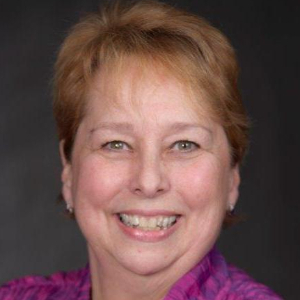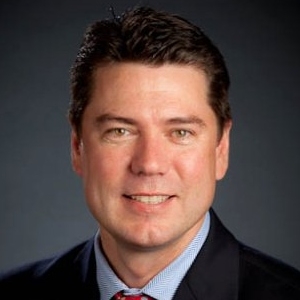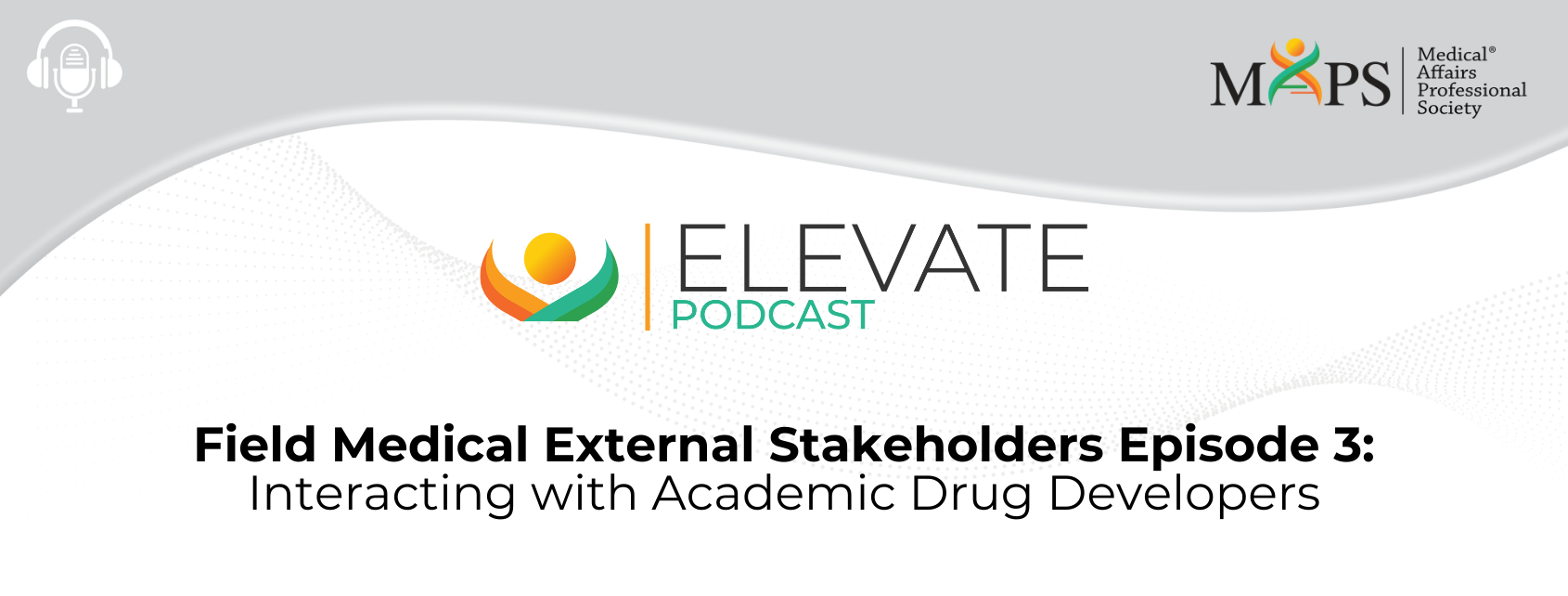Field Medical External Stakeholders: Partnering for Today and Tomorrow – Episode 3 Interacting with Academic Drug Developers
Objectives:
At the end of this series of podcasts, the participant will be able to:
- Discuss the functions and activities of key external stakeholders
- Identify potential areas for compliant collaboration by MSLs with Academic Drug Developers

MODERATOR: Kathryn Gann, PhD

INTERVIEWER: Robert Groebel

INTERVIEWEE: Jeffrey Patrick, PharmD
Following is an automated transcription provided by otter.ai. Please excuse inaccuracies.
Kathryn Gann 00:00
Welcome to the Medical Affairs Professional Society Field Medical Focus Area Working Groups podcast series entitled, “Field Medical External Stakeholders Partnering for Today and Tomorrow”. In this third podcast we will discuss interacting with academic drug developers. I’m Kathryn Gann. I’m a member of the Field Medical Focus Area Working Group, and I’ll be the moderator for this podcast. Currently, I’m an independent consultant in Medical Affairs, having spent my 30-year career as an MSL, an MSL manager and an MSL trainer. Our legal disclaimer is as follows. The views expressed in this recording are those of the individuals and do not necessarily reflect on the opinions of MAPS, or the companies with which they are affiliated. This presentation is for informational purposes only and is not intended as legal or regulatory advice. We encourage you to engage in conversations about Field Medical with other MAPS members via MAPS connect on the MAPS website or mobile app. Simply log in with the email address and password associated with your MAPS account and access the global community. Then, click on the discuss tab and scroll down to Field Medical Subject Area to post a question or review previous postings. The objectives for this series of podcasts are that at the end of this series, the participant will be able to one, discuss the functions and activities of key external stakeholders and two, identify potential areas for compliant collaboration by MSLs with key external stakeholders. I’d like to thank today’s panelists for sharing their subject matter expertise with the MAPS membership. Speaking today are Robert Groebel, Vice President Global Medical Strategy at Monocl. Robert is also a member of the Field Medical Focus Area Working Group and Robert will be our interviewer. And Jeff Patrick, Senior Director of The Drug Development Institute at The Ohio State University Comprehensive Cancer Center. Jeff will be our interviewee. Robert, let’s turn this over to you. And if you could kick it off by telling us a little bit about yourself, please.
Robert Groebel 02:12
Thanks, Kathryn. Yeah, broadly, I’ve had about 30 years of healthcare experience in the life sciences in both commercial and medical roles. But most recently in my career, I’ve been working on the software side of the industry, focus specifically on Medical Affairs and helping our clients develop digital strategies analytic strategies to ensure that they are engaging effectively with the right stakeholders, and really developing insights that will help them generate science into the future. Jeff, how about an introduction from yourself?
Jeff Patrick 02:45
Thank you for the opportunity to speak with you both, Robert and Kathy. Hi, I’m Jeff Patrick. I’m a PharmD by training, residency trained, spent a couple of years in academic medicine and then moved into the pharmaceutical industry where I initially was an MSL then became an MSL manager, worked up through the ranks at companies that ranged from startup to global organizations, holding positions of Global Vice President and ultimately Chief Scientific Officer. In my current role, I have an opportunity as the Director of a embedded biotech-like entity called The Drug Development Institute, that’s part of The Ohio State University’s Comprehensive Cancer Center. And their mission there is to help advance preclinical cancer treatment assets through the preclinical pipeline to enable them for actual full clinical development and ultimately, commercial partnership. In addition, I’m actually the Chief Scientific Officer of a sort of pharmaceutical firm as well where we’re in the preclinical stages with some assets that we hope to bring to market as well. Pleasure to meet everyone.
Robert Groebel 03:51
That’s fascinating, Jeff. So, when you think about the work that your department and your function is doing at Ohio State, clearly you’re partnering with industry, but who specifically or what functions within industry do you normally interact with?
Jeff Patrick 04:08
Great question. We typically interact initially with business development teams, or if it’s a, if it’s a firm structured with search and evaluation, those are the types of initial reactions, or interactions we might have. Admittedly, however, recently, we’ve had interactions with numerous MSLs, from industry, who have regional areas of coverage as most MSLs, or all MSLs do, and we encounter them through their, you know, in working with the KOLs that we interface with on our preclinical research, and, ultimately, as I mentioned, moving our assets through a pipeline toward clinical development. So, we share if you will KOLs in some regard because my preclinical team ultimately relies on our KOLs and as many or all MSLs do.
Robert Groebel 04:58
So, recognizing that this is, this is very early-stage work, you know, what are the real goals of the interactions, whether it’s your interactions with BD or with the Field Medical teams that are that are coming out to Ohio to see you?
Jeff Patrick 05:12
Great question. And the important part I think that the audience should understand is that the large academic research organizations really have a gigantic wealth of basic researchers. And these are the folks that are identifying novel targets, really, regardless of therapeutic area, whether it’s oncology, in our case, or cardiovascular medicine, endocrinology, diabetes, metabolism, whatever it may be autoimmune diseases, we’re on sort of the front edge. And so, you have this vast number of researchers all sort of collaborating at the university setting. And so, the opportunity really is for the business development team members or research and evaluation or even MSLs, to understand the scope and breadth of those early-stage targets, because frankly, in my mind, the benefit to the pharma company is that they can take advantage of all of that basic research, as it continues to advance and be de-risked.
Robert Groebel 06:09
Just a, just a curious question from my end of things, Jeff, and recognizing just the sheer volume of companies that are currently have an oncology focus and you know, the 1000 plus compounds that are either in development or reviewed today. How does Ohio State stay current with what all of the industry is doing to know that your science could be relevant to the pipeline of a company that could support the clinical development of a drug.
Jeff Patrick 06:38
So having built on my nearly 20 years in the industry, I actually have grown our team internally. And we’re fortunate to have the funding to do this. But we actually have a dedicated business development person who has a PhD cancer biologist, as well as having spent time in patent work and patent, with a patent firm. So, we actually evaluate as a pharma company would every aspect of an asset not just the development of the experimental structure and the research operating plans to move those assets to preclinical stages. We also have a relationship with the college of business within whom we also have a PhD with a cancer biology background, or rather, cancer immunology should say, who helps us do landscape and competitive intelligence analyses. So, we evaluate not only the preclinical scientific rigor and experimental design of our portfolio, we also evaluate the landscape around us for like, or similar compounds. And we’re agnostic, whether it’s small molecule, large molecule or even cellular therapies. And then we tried to do to the ability that we have to bring those comparative assets into our experimental design and do head-to head analyses to understand how we are differentiated. So, we do a lot of work that covers all the aspects from IP extension, or expansion, or new filings all the way through head-to-head analyses. So, we do a lot with a lot of folks that really help us it takes a gigantic team to do drug development. And so that’s the type of work that we do to ensure that our portfolio is understandable by small and mid or even large sized pharma companies or even venture capital firms seeking to raise funding to, you know, advance a clinical asset.
Robert Groebel 08:25
It’s fascinating, it’s amazing how complex drug development has become over the last several decades. And I guess that leads me to my next question, recognizing your experience, you know, in the field, and then leading field teams, have you seen a, you know, a fundamental shift in the in the role or the profile of the MSL, now that you’re on the outside of the industry looking in?
Jeff Patrick 08:50
I would say that I’ve seen more of the involvement of the field based medical teams like the MSLs in activities like search and evaluation, the, you know, the MSLs, were really represent the Medical Affairs team. And there’s sort of the sharp end of the spear out there interfacing with these academic and scientific researchers who are really involved in the earliest stages all the way through, you know, the phase three and four clinical trial programs. So, the MSLs have the opportunities to advance activities, as I’ve seen, again, over the past couple of decades and health economics analyses and discussions, but also this sort of early understanding of what’s going on preclinically in the areas in the centers where they cover within the region. So, I’ve seen a bit more, I would say, the migration of the MSLs to being a part of those search and evaluation efforts and really creating collaborative opportunities. An example recently, I won’t divulge the company, but it was an opportunity to participate in a molecular screening program that the company has a large molecule library, and they offered to, you know, and work with our drug development institute for screening against that compound library. So, those are the types of opportunities and that was entirely shepherded by an MSL. So, there are opportunities where MSLs can get into discussions and create collaborations very early in the preclinical area.
Robert Groebel 10:13
Thanks, that’s interesting and thinking about all of this experience but you’re inside of pharma and outside of pharma experience, are there, are there behaviors are there characteristics that you would say differentiate an average MSL from a great MSL or good MSL?
Jeff Patrick 10:33
I think the importance of an MSL is their credibility relative to how they present the information. Admittedly, they’re working for a company, and they are strongly aware of that company’s individual portfolio, but it’s important that they understand the context of the information they’re providing. Because ultimately, our clinicians on the academic research side are going to have relationships with all of the competitors. So, it’s really important as to how those MSLs contextualize the information that they have to present relative to their assets and development, and in a comparative fashion to the other assets from other potentially competitive companies. So, I think credibility is vital. And that’s achieved and maintained through appropriate contextualization of the information they provide, as well as obviously the extent and, and amount of knowledge that they have. I mean, if it’s an early if it’s a recent hire, let’s say MSL, then they may not be dug into the full data package for a given asset. So, you know, the more advanced the MSL gets with their knowledge, the more that’s going to continue to grow, and how they’re able to present it. So, I think there’s a lot of aspects around ensuring that the information they’re providing is whole and complete and accurate.
Robert Groebel 11:50
Interesting, you know, there’s been such a, there’s been such a concern, I think, across the industry, as we’re kind of making our way out of, out of this COVID situation, but there’s still probably going to be a reliance on remote technology to, you know, engage in scientific discourse. And so many MSLs and MSL functional leaders that I’ve spoken to, are concerned about how to, how to best establish a relationship within a ,within a, a molecule, or within an indication where you may not have any experience, do you have any best practices, you might be able to share around, you know, developing credible relationships with new, with new experts or new scientists?
Jeff Patrick 12:33
Certainly, that’s a challenge. And I would say it’s a challenge on really both ends. Because at the academic research or clinical research side of the business, they’re facing the same thing. Everyone was impacted by COVID. And frankly, many, many centers continue to be impacted by it. So, it’s however, I think that the benefit to it from the, from the pharma side and MSL side of the equation is that the clinicians and academic researchers have all adapted, our team has been working remotely for over a year and a half, as many teams that are not in direct patient care have been working remotely. So, I think the entire landscape has changed as far as how clinicians and scientists and industry folks utilize this remote working technologies and, frankly, the bandwidth, has enabled these conversations to go very effectively, very efficiently, very smoothly with minimal disruptions and enable the ability to convey information remotely. So, I think the whole world has taken a step forward in how to do that type of communication. And while I can’t say that there’s a specific best practices as far as initiating the conversation, again, I think it boils down to understanding your KOLs, and what their areas of research interest are, and then approaching him with that in mind as you present your information.
Robert Groebel 13:52
I appreciate that last sentence so much. I mean, I think it’s absolutely mission critical for the MSL to understand the needs of the expert, and make sure that they deliver on those expectations so that you can drive a really mutually beneficial relationship. So, I appreciate that very much. And recognizing that, you know, you started your career as an MSL, and now you’re doing something incredibly innovative and novel. Were there any, were there any points on your career path that you could point to that you think may have led you to where you are today?
Jeff Patrick 14:26
Well, I would say that I’ve had exceptional mentors along the way with tremendous amounts of experience, both as colleagues and as managers. And I also would say that, that I was encouraged at times in my career where maybe I didn’t have the full breadth of experience that I would feel comfortable with taking on a new role. For instance, when I was the global Vice President, I had additional responsibilities added to my requirements, and that sort of forced me out of my comfort zone to take on and understand new roles, such as Pharmacovigilance or Medical Information or other areas beyond just being an MSL. So, while we had interfaced with those teams in my field-based operations, just the ability to take on new challenges, and again, I can say that I had directors and vice presidents and mentors along the way that encouraged me to take on those additional responsibilities. But then doing the work, to gain the understanding around them, and to really try and be productive and make sure that the teams are being productive along the way. So, I can’t say that there’s a particular area or an instance where they really prompted me to change, but I would just say the whole dynamic of being able to and be willing to accept new responsibilities and then learn and grow into those roles.
Robert Groebel 15:48
That’s terrific. Thanks very much. I really appreciate that answer also. So, with that, Kathy, I’ll turn it back over to you.
Kathryn Gann 15:56
Thank you, Robert. And thank you, Jeff. This was a very interesting conversation. I never realized how a drug development institute like Jeff has at an academic center really operates much like a business development group within a pharma company, keeping an eye on the landscape, looking what’s going on. So that was educational for me. I think the take homes for our MSLs, a couple of things, is to know your KOLs. We’ve talked about this before. But Jeff made a really good point about the KOLs that his Institute is working with the same KOLs that the MSL is calling on. And so, knowing your KOL’s research interests, knowing the scope of what your company is looking at, and being able to partner to put the two together is very impactful. And it certainly relies on all those things that we talk about that makes a successful MSL. Careful listening and credibility. And finally, Jeff gave us a great example about how being an MSL and having those foundational skills can help you move on to other careers, whether that’s in industry, or in this case, at an academic center. So, I really appreciate how far ranging this conversation was. And it really, I think, met our learning objectives of having a better understanding and the role, of the role and function of an academic drug development institute, and how MSLs may compliantly interact with that entity. So, this has been the third podcast in a series on the topic of Field Medical External Stakeholders Partnering for Today and Tomorrow. If you’re a MAPS member, thank you for your support of MAPS. If you’re not yet a MAPS member and would like access to additional resources in this area, please visit the MAPS website to explore joining and that is MedicalAffairs.org/membership. This concludes the podcast.






